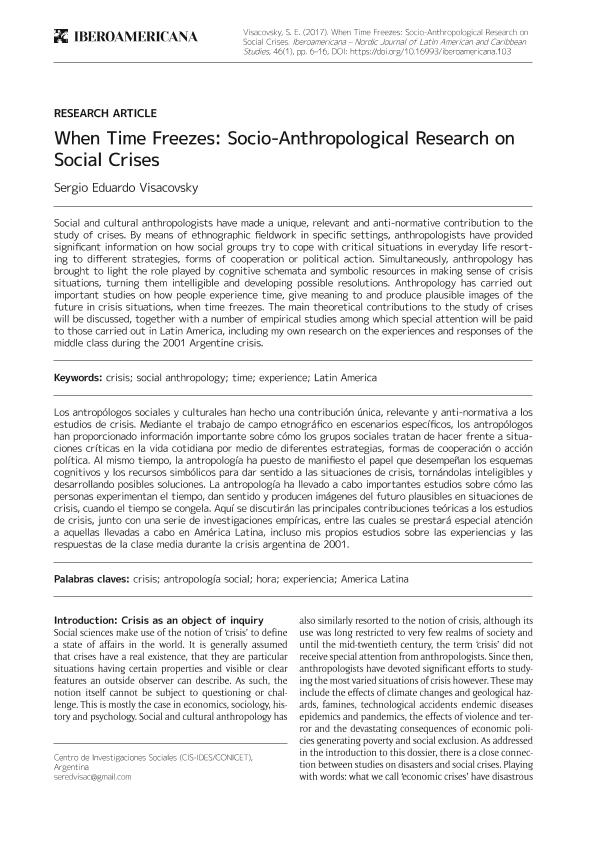Mostrar el registro sencillo del ítem
dc.contributor.author
Visacovsky, Sergio Eduardo

dc.date.available
2018-05-31T14:03:46Z
dc.date.issued
2017-01
dc.identifier.citation
Visacovsky, Sergio Eduardo; When Time Freezes: Socio-Anthropological Research on Social Crises; Stockholm University Press; Iberoamericana; 46; 1; 1-2017; 6-16
dc.identifier.issn
0073-4349
dc.identifier.uri
http://hdl.handle.net/11336/46765
dc.description.abstract
Los antropólogos sociales y culturales han hecho una contribución única, relevante y anti-normativa a los estudios de crisis. Mediante el trabajo de campo etnográfico en escenarios específicos, los antropólogos han proporcionado información importante sobre cómo los grupos sociales tratan de hacer frente a situaciones críticas en la vida cotidiana por medio de diferentes estrategias, formas de cooperación o acción política. Al mismo tiempo, la antropología ha puesto de manifiesto el papel que desempeñan los esquemas cognitivos y los recursos simbólicos para dar sentido a las situaciones de crisis, tornándolas inteligibles y desarrollando posibles soluciones. La antropología ha llevado a cabo importantes estudios sobre cómo las personas experimentan el tiempo, dan sentido y producen imágenes del futuro plausibles en situaciones de crisis, cuando el tiempo se congela. Aquí se discutirán las principales contribuciones teóricas a los estudios de crisis, junto con una serie de investigaciones empíricas, entre las cuales se prestará especial atención a aquellas llevadas a cabo en América Latina, incluso mis propios estudios sobre las experiencias y las respuestas de la clase media durante la crisis argentina de 2001.
dc.description.abstract
Social and cultural anthropologists have made a unique, relevant and anti-normative contribution to the study of crises. By means of ethnographic fieldwork in specific settings, anthropologists have provided significant information on how social groups try to cope with critical situations in everyday life resorting to different strategies, forms of cooperation or political action. Simultaneously, anthropology has brought to light the role played by cognitive schemata and symbolic resources in making sense of crisis situations, turning them intelligible and developing possible resolutions. Anthropology has carried out important studies on how people experience time, give meaning to and produce plausible images of the future in crisis situations, when time freezes. The main theoretical contributions to the study of crises will be discussed, together with a number of empirical studies among which special attention will be paid to those carried out in Latin America, including my own research on the experiences and responses of the middle class during the 2001 Argentine crisis.
dc.format
application/pdf
dc.language.iso
eng
dc.publisher
Stockholm University Press
dc.rights
info:eu-repo/semantics/openAccess
dc.rights.uri
https://creativecommons.org/licenses/by-nc-sa/2.5/ar/
dc.subject
Antropologia
dc.subject
Crisis
dc.subject
Temporalidad
dc.subject
Experiencia
dc.subject.classification
Otras Sociología

dc.subject.classification
Sociología

dc.subject.classification
CIENCIAS SOCIALES

dc.title
When Time Freezes: Socio-Anthropological Research on Social Crises
dc.type
info:eu-repo/semantics/article
dc.type
info:ar-repo/semantics/artículo
dc.type
info:eu-repo/semantics/publishedVersion
dc.date.updated
2018-05-18T19:28:26Z
dc.identifier.eissn
2002-4509
dc.journal.volume
46
dc.journal.number
1
dc.journal.pagination
6-16
dc.journal.pais
Suecia

dc.journal.ciudad
Estocolmo
dc.description.fil
Fil: Visacovsky, Sergio Eduardo. Consejo Nacional de Investigaciones Científicas y Técnicas. Oficina de Coordinación Administrativa Parque Centenario. Centro de Investigaciones Sociales. Instituto de Desarrollo Económico y Social. Centro de Investigaciones Sociales; Argentina
dc.journal.title
Iberoamericana
dc.relation.alternativeid
info:eu-repo/semantics/altIdentifier/url/http://www.iberoamericana.se/articles/iberoamericana.103
dc.relation.alternativeid
info:eu-repo/semantics/altIdentifier/doi/http://dx.doi.org/10.16993/iberoamericana.103
Archivos asociados
